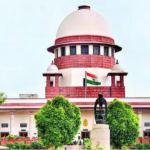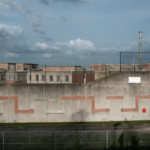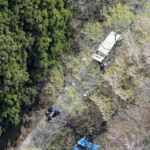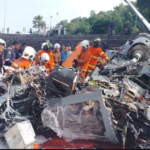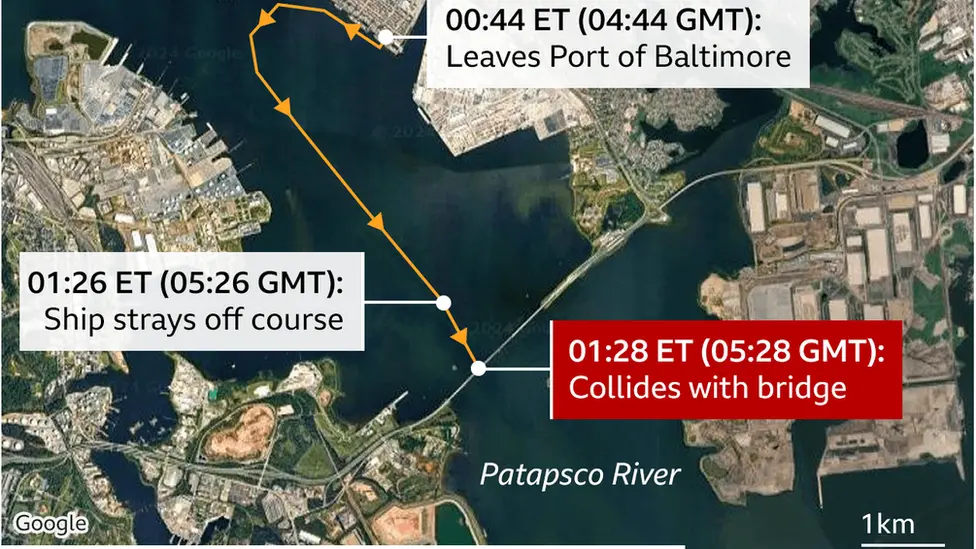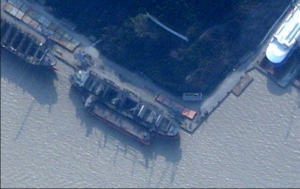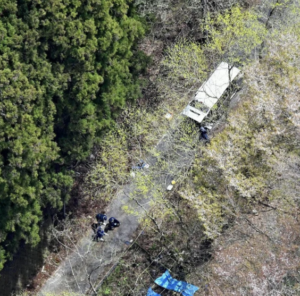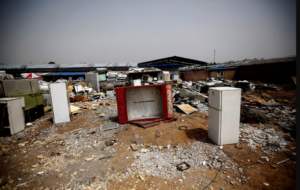
Fears of disruption to global supply chains after Baltimore bridge crash
Fears have been raised of significant disruption to global supply chains after a container ship crashed into a bridge in the US city of Baltimore.
The ship, named the Dali, hit a support column of the Francis Scott Key Bridge in the early hours of Tuesday morning, causing it to collapse.
The bridge spanned the entrance to the Port of Baltimore, the busiest port in the US for car exports and the ninth-busiest overall.
Six people are missing presumed dead.
The US Coast Guard has suspended its search and rescue operation and begun a recovery mission. The focus is now turning to the investigation into what went wrong, with a team of transportation safety experts hoping to board the stricken ship and recover its data recorder.
Officials have said that maritime traffic through the port – which last year amounted to more than 47 million tonnes of foreign cargo – will be suspended “until further notice”.
Speaking to the BBC, Marco Forgione, director general at The Institute of Export and International Trade, which represents UK businesses involved in international trade, said the suspension would have a “significant ripple effect on global supply chains”.
“Over 750,000 cars and vehicles transited through Baltimore in the last year,” he told Radio 4’s The World Tonight.
“Those are major US brands and UK and EU brands, from General Motors and Ford to [Jaguar Land Rover], Nissan, Fiat, and Audi.
“In addition, Baltimore is a significant exporter of liquified natural gas [LNG] and that has implications for the UK and the EU.
“Something around half a million tonnes of LNG leave Baltimore per month, so the implications of what’s happened are significant and will cascade before we’re able to get Baltimore back up and running again.”
As well as maritime traffic, the Port of Baltimore is directly responsible for some 15,000 jobs and supports an estimated 140,000 more.
Following the accident, Danish shipping giant Maersk, whose cargo the Dali was carrying, said it would be “omitting Baltimore on all our services for the foreseeable future”.
A number of rail and coal companies have also warned their customers of disruption to coal exports.
US Secretary of Transportation Pete Buttigieg said at a briefing there was “no question that this will be a major and protracted impact to supply chains”.
“It’s too soon to offer estimates on what it will take to clear the channel and reopen the port,” he said.
President Biden told reporters that the US government would “move heaven and earth to reopen the port and rebuild the bridge as soon as humanly possible”, but added that the process was going to “take some time.”
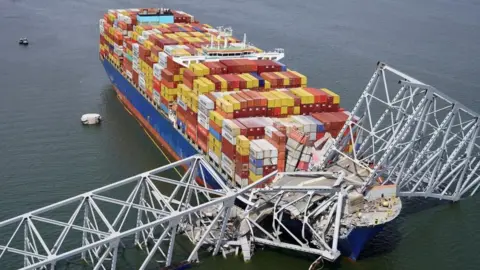 Reuters
ReutersThe exact cause of the crash is still being established, but officials have said the ship suffered a “power issue” and issued a distress call before hitting the bridge.
Authorities closed the bridge to car traffic when they received the call, but a number of vehicles that were already on the bridge fell into the water when it collapsed.
A huge search and rescue effort ran through much of Tuesday, with two people pulled from the water, one of them in a serious condition.
The Maritime and Port Authority of Singapore, where the Dali was flagged, said the ship’s certificates covering its structural integrity and the functionality of its equipment were valid at the time of the incident.

